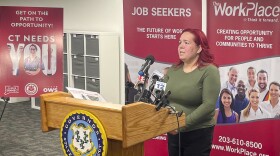People who work in service industries have been on the front lines of the coronavirus crisis in more ways than one. A new report from the Federal Reserve Bank of Boston says that means policymakers must put them first when it comes to rebuilding the economy.
We depend on your support. Donate to Connecticut Public today.
If you work in a service industry -- restaurants, hotels, grocery stores, warehouses -- it’s likely one of two things has happened to you in the last month -- you’ve either lost your job entirely, or you’re trapped in a job that requires you to leave your home and risk infection.
“This is a workforce who we tend not to think about. And this is a workforce who we depend on,” said Sara Chaganti, senior policy analyst at the Federal Reserve Bank of Boston.

In Connecticut, as in many other places, the plight of service workers means the brunt of this crisis is falling on people of color.
“Almost a quarter are Hispanic, whereas in Connecticut overall 1 in 7 workers is Hispanic,” Chaganti said. “In Bridgeport and Hartford specifically, half of these workers are Hispanic.”
They’re also disproportionately poor. Over half in the big cities and over a third statewide live on wages that are less than 200% of the federal poverty level. A third are dependent on SNAP or food stamps.
“They are going into this situation not really having been able to save,” she said, “and so if they’re laid off suddenly, if illness strikes, they’re not going to have that cushion that’s going to help them weather a situation like this.”
Chaganti says the massive impact of the coronavirus pandemic on these workers should change the way we think about rebuilding our economy.
“We really have to think about how we value this work, we have to think about prioritizing this workforce in the recovery, supporting these workers in particular,” she said. “That means supporting them with ongoing income until the economy is up and running again, and at that point putting more worker protections in place to ensure they are resilient in the future.”
Chaganti says while at the moment we’re all still trying to make it to next week, she’s hopeful the conversation will soon turn to how to structure a more equitable recovery.





